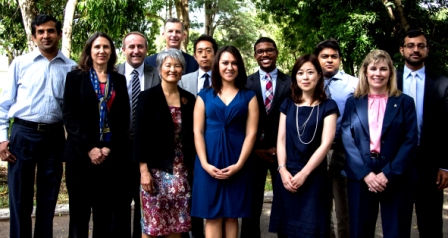WASHINGTON, DC | June 30, 2014 - This week on BIZ+SOCIAL, we bring you the best from The New Global Citizen, Harvard Business Review, Citizen IBM, and more.
GLOBAL PRO BONO
Saving Ghana’s Next Generation from HIV
 At roughly 15 percent, Ghana’s high mother-to-child HIV transmission rate makes this sub-Saharan African nation among the world’s 22 countries with the highest incidence of HIV infection in pregnant women. The Ghanaian Ministry of Health is working with IBM, the Yale School of Medicine and other global partners to reduce Ghana’s mother-to-child HIV transmission rate to less than 1 percent by 2020 – just six years from now. Helping Ghana achieve this ambitious and essential goal is what attracted me to the recent IBM Corporate Service Corps/Yale School of Medicine collaboration with their Ministry of Health. Africa is on the rise. It has the world’s youngest population, and soon will have the largest population of any continent. In addition to the tragic human cost of HIV, Ghana’s developing economy cannot afford to lose any more people to preventable disease. As part of the broader effort to reduce the country’s HIV transmission rate, my Corporate Service Corp (CSC) sub-team worked with the Ghana Health Service to develop ways to capture and analyze public health data, and refine it into actionable information in the fight against HIV. Read More...
At roughly 15 percent, Ghana’s high mother-to-child HIV transmission rate makes this sub-Saharan African nation among the world’s 22 countries with the highest incidence of HIV infection in pregnant women. The Ghanaian Ministry of Health is working with IBM, the Yale School of Medicine and other global partners to reduce Ghana’s mother-to-child HIV transmission rate to less than 1 percent by 2020 – just six years from now. Helping Ghana achieve this ambitious and essential goal is what attracted me to the recent IBM Corporate Service Corps/Yale School of Medicine collaboration with their Ministry of Health. Africa is on the rise. It has the world’s youngest population, and soon will have the largest population of any continent. In addition to the tragic human cost of HIV, Ghana’s developing economy cannot afford to lose any more people to preventable disease. As part of the broader effort to reduce the country’s HIV transmission rate, my Corporate Service Corp (CSC) sub-team worked with the Ghana Health Service to develop ways to capture and analyze public health data, and refine it into actionable information in the fight against HIV. Read More...
IMPACT & INNOVATION
Why Tech Innovation Should Matter To NGOs
 Every industry, sector, and market goes through times of transformation and innovation. Whether you’re selling smart phones or automobiles, technological change is a powerful force that drives industry innovation and disruption, shaking up traditional industry leaders and establishing new companies. The world recently watched this play out in the computing industry as users migrated away from desktops and moved towards mobile devices. But the implications of the Innovator’s Dilemma are not limited to the commercial sector; we also see this phenomenon transforming the business of nongovernment organizations (NGOs) and reshaping how programs are delivered to beneficiaries. Organizations that effectively adapt will be positioned well for the future; those who don’t risk relevance as new models better serve beneficiaries and match donor interests. When the Innovator’s Dilemma was first published in 1997 by Clayton Christensen, a Harvard Business School professor, it was a radical idea. Christensen’s theory of disruptive innovation posits that strategies and tactics that help one company become a market leader are not necessarily the same approach needed to maintain that position. Read More…
Every industry, sector, and market goes through times of transformation and innovation. Whether you’re selling smart phones or automobiles, technological change is a powerful force that drives industry innovation and disruption, shaking up traditional industry leaders and establishing new companies. The world recently watched this play out in the computing industry as users migrated away from desktops and moved towards mobile devices. But the implications of the Innovator’s Dilemma are not limited to the commercial sector; we also see this phenomenon transforming the business of nongovernment organizations (NGOs) and reshaping how programs are delivered to beneficiaries. Organizations that effectively adapt will be positioned well for the future; those who don’t risk relevance as new models better serve beneficiaries and match donor interests. When the Innovator’s Dilemma was first published in 1997 by Clayton Christensen, a Harvard Business School professor, it was a radical idea. Christensen’s theory of disruptive innovation posits that strategies and tactics that help one company become a market leader are not necessarily the same approach needed to maintain that position. Read More…
LEADERSHIP
Good Managers Look Beyond Their “Usual Suspects”
 In the movie Casablanca, there’s a famous scene where Captain Renault, the head of the French police, avoids investigating the murder of a Nazi officer by telling his people to “round up the usual suspects.” The implication, of course, is that everyone should look busy and professional, even if the routine doesn’t really accomplish anything. I’m always reminded of this line when I see managers respond to performance challenges by putting together a task force of the “usual suspects” to deal with the issue. These task force members usually end up with multiple specialty assignments piled on top of their regular duties. And because these few go-to people are spread so thin, they ultimately don’t accomplish all that much. Managers sometimes “round up the usual suspects” because they only trust a small number of people to handle key projects or initiatives. Every organization has its “glue people,” the ones who don’t show up in organization charts but are assigned to every task force or initiative because they are respected and trusted. Read More…
In the movie Casablanca, there’s a famous scene where Captain Renault, the head of the French police, avoids investigating the murder of a Nazi officer by telling his people to “round up the usual suspects.” The implication, of course, is that everyone should look busy and professional, even if the routine doesn’t really accomplish anything. I’m always reminded of this line when I see managers respond to performance challenges by putting together a task force of the “usual suspects” to deal with the issue. These task force members usually end up with multiple specialty assignments piled on top of their regular duties. And because these few go-to people are spread so thin, they ultimately don’t accomplish all that much. Managers sometimes “round up the usual suspects” because they only trust a small number of people to handle key projects or initiatives. Every organization has its “glue people,” the ones who don’t show up in organization charts but are assigned to every task force or initiative because they are respected and trusted. Read More…
ENTERPRISE DEVELOPMENT
World Cup Power Dynamics Foreshadow Opportunities at US-Africa Leaders Summit
 This week, soccer teams from 16 countries advanced to the sudden death round of the World Cup. During each game, a combination of a team’s individual skills, focus, and their ability to function as a team will determine whether they succeed or fail, whether they go home early, or lift the cup on July 13th and become heroes at home. So far during this year’s cup, teams from smaller countries not typically granted the same influence on the global stage are demanding equality and respect on the playing field. Countries such as Costa Rica, Ghana, Algeria, and Iran have shown the world that they have what it takes to challenge the world powers on the soccer pitch on equal terms. And yet, power asymmetries still persist on the field: Algeria and Nigeria are the only two Africa nations to advance to the 16 round, as Germany, France, Belgium, Switzerland, the Netherlands, Greece, and (perhaps most surprisingly) the United States move forward.As the world turns its attention to the global power plays currently playing out in stadiums across Brazil, such circumstances present a unique opportunity to…Read more…
This week, soccer teams from 16 countries advanced to the sudden death round of the World Cup. During each game, a combination of a team’s individual skills, focus, and their ability to function as a team will determine whether they succeed or fail, whether they go home early, or lift the cup on July 13th and become heroes at home. So far during this year’s cup, teams from smaller countries not typically granted the same influence on the global stage are demanding equality and respect on the playing field. Countries such as Costa Rica, Ghana, Algeria, and Iran have shown the world that they have what it takes to challenge the world powers on the soccer pitch on equal terms. And yet, power asymmetries still persist on the field: Algeria and Nigeria are the only two Africa nations to advance to the 16 round, as Germany, France, Belgium, Switzerland, the Netherlands, Greece, and (perhaps most surprisingly) the United States move forward.As the world turns its attention to the global power plays currently playing out in stadiums across Brazil, such circumstances present a unique opportunity to…Read more…
CITIZEN DIPLOMACY
VIDEO: USA Soccer Star Jozy Altidore’s Important Mission Off the Field
 Watch this news clip featuring Jozy Altidore, to learn how he gives back to the global community. Altidore is not only an American soccer icon, but an exemplary citizen diplomat on and off the field. Watch Here…
Watch this news clip featuring Jozy Altidore, to learn how he gives back to the global community. Altidore is not only an American soccer icon, but an exemplary citizen diplomat on and off the field. Watch Here…
MORE
As It’s Lights Out In The West, Africa Needs Help To Switch On
Partnering with Corporations for Greater Scale
VisionSpring Aims to Provide Eyeglasses to Millions
Amplifying Innovation through Collaboration


